Dozens of demonstrators yesterday staged a protest outside the legislature to demand that lawmakers stringently review the Economic Cooperation Framework Agreement (ECFA) that Taiwan and China signed on Tuesday.
Wearing T-shirts with the inscription “the people are the masters” and billing themselves as a non-violent protest group, the group silently marched around the building holding placards reading “an ECFA referendum is a basic human right.”
“It’s difficult for us to believe how the [Chinese Nationalist Party (KMT)]-dominated legislature can stand up for public interests when it reviews and monitors the ECFA,” said Cheng Li-chun (鄭麗君), an executive director at the People Sovereignty Action Network, which organized the rally.
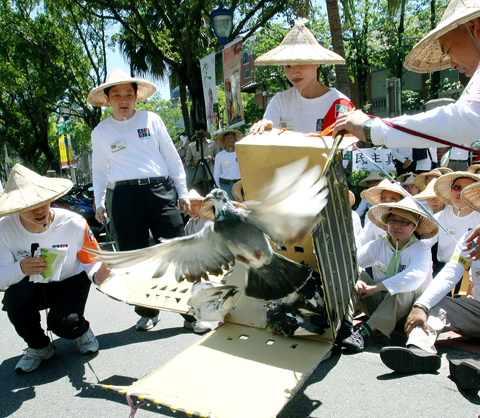
PHOTO: CNA
“We want the arguments over the ECFA to be settled by the Taiwanese public and democratically so,” she said.
The ECFA, which will lower cross-strait trade barriers and customs tariffs, was signed in the Chinese city of Chongqing despite heavy protests by opposition parties and a number of pro-independence groups last week.
Lawmakers must approve the trade pact before it can become valid. Both the KMT and the Democratic Progressive Party (DPP) caucuses have proposed calling a provisional session on Wednesday to screen and finalize the ECFA.
The KMT caucus hopes the agreement will be debated and passed as a single package, without having to approve it clause by clause — a move that has drawn heavy opposition from both yesterday’s protesters and DPP lawmakers.
The DPP said the ECFA document should be subject to the same legislative screening as other bills.
“Despite our small numbers, we will not let the government pass the ECFA review easily … we will fight this to the end,” DPP Legislator Liu Chien-kuo (劉建國) said in the legislature on Saturday.
These calls were repeated by the 90 protesters, who wore straw hats to protect themselves in the heat as the temperature reached 37°C. The group first gathered at the 228 Peace Park in the morning before heading to the legislature across the street.
During the 0.5km walk, the protesters, most middle-aged and above, occasionally broke into a song with one line of lyrics: “I love Taiwan.”
“I’m very worried that this ECFA, if approved, will take away Taiwan’s sovereignty and move our country closer to China,” an elderly protester surnamed Lee said.
“The ECFA could eventually make Taiwan part of China, like Hong Kong and Macau,” another protester said.
Speaking during the march, Cheng said that because the ECFA prompted so much controversy, the Referendum Review Committee should have agreed last month to public demands to hold a nationwide plebiscite on the issue.
The committee rejected two proposals — one by the DPP and another by the Taiwan Solidarity Union (TSU) — that would have asked voters whether they agreed with the government’s move to sign the ECFA. The 21-member committee based its decisions on “problems” with the wording of the question and the content of the proposals.
A third proposal, also by the TSU, is currently under review.
The failed bids show how the review committee and the Referendum Act (公民投票法) place unfair limits on democracy, said Chung Chia-pin (鍾佳濱), another official at the action network.
“It’s a birdcage law that restricts the basic human rights,” he said. “It’s extremely unreasonable and it needs to be revised.”
Standing in front of the crowd, he later opened up a cardboard box containing six pigeons and said their release represented the aspirations of Taiwanese.
“We call on the legislature … to first break the birdcage referendum law, revise the referendum law and then review the ECFA,” he said.
Also See: Academic says that ECFA gives the edge to Beijing
Also See: The rise of neo-imperialist China
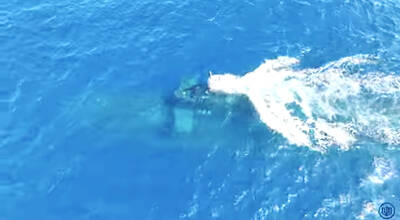
CSBC Corp, Taiwan (台灣國際造船) yesterday released the first video documenting the submerged sea trials of Taiwan’s indigenous defense submarine prototype, the Hai Kun (海鯤), or Narwhal, showing underwater navigation and the launch of countermeasures. The footage shows the vessel’s first dive, steering and control system tests, and the raising and lowering of the periscope and antenna masts. It offered a rare look at the progress in the submarine’s sea acceptance tests. The Hai Kun carried out its first shallow-water diving trial late last month and has since completed four submerged tests, CSBC said. The newly released video compiles images recorded from Jan. 29 to
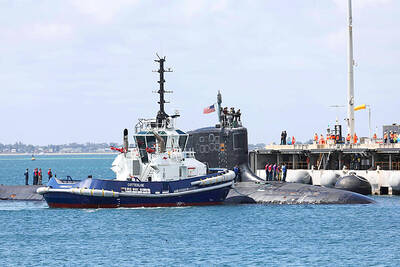
DETERRENCE EFFORTS: Washington and partners hope demonstrations of force would convince Beijing that military action against Taiwan would carry high costs The US is considering using HMAS Stirling in Western Australia as a forward base to strengthen its naval posture in a potential conflict with China, particularly over Taiwan, the Wall Street Journal reported on Saturday. As part of its Indo-Pacific strategy, Washington plans to deploy up to four nuclear-powered submarines at Stirling starting in 2027, providing a base near potential hot spots such as Taiwan and the South China Sea. The move also aims to enhance military integration with Pacific allies under the Australia-UK-US trilateral security partnership, the report said. Currently, US submarines operate from Guam, but the island could
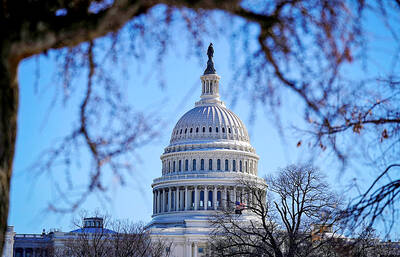
RESTRAINTS: Should China’s actions pose any threat to Taiwan’s security, economic or social systems, China would be excluded from major financial institutions, the bill says The US House of Representatives on Monday passed the PROTECT Taiwan Act, which states that Washington would exclude China from participating in major global financial organizations if its actions directly threaten Taiwan’s security. The bill, proposed by Republican Representative Frank Lucas, passed with 395 votes in favor and two against. It stipulates that if China’s actions pose any threat to Taiwan’s security, economic or social systems, the US would, “to the maximum extent practicable,” exclude Beijing from international financial institutions, including the G20, the Bank for International Settlements and the Financial Stability Board. The bill makes it clear that China must be prepared
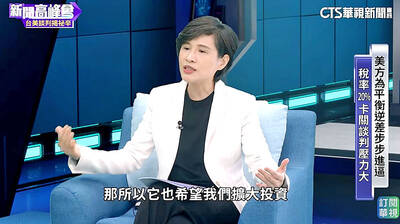
Taiwanese trade negotiators told Washington that Taipei would not relocate 40 percent of its semiconductor production to the US, and that its most advanced technologies would remain in the nation, Vice Premier Cheng Li-chiun (鄭麗君) said on Sunday. “I told the US side very clearly — that’s impossible,” Cheng, who led the negotiation team, said in an interview that aired on Sunday night on Chinese Television System. Cheng was referring to remarks last month by US Secretary of Commerce Howard Lutnick, in which he said his goal was to bring 40 percent of Taiwan’s chip supply chain to the US Taiwan’s almost